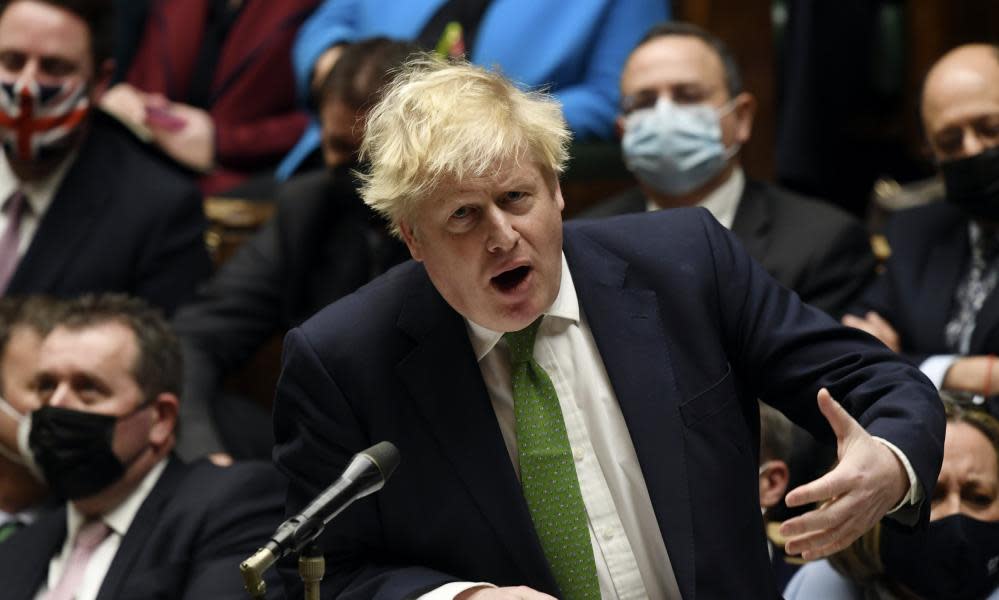Bruised Boris Johnson comes out boosting after TV humiliation

Boris Johnson’s habitual boosterism was back on display on Wednesday after a humiliating TV interview a day earlier raised questions about his state of mind.
By scheduling a House of Commons statement on lifting Covid restrictions in England immediately after prime minister’s questions, Johnson’s team enabled him to return to comfortable territory, hailing the UK’s booster vaccine rollout and bashing Keir Starmer.
But the fact it was Sajid Javid, not Johnson, fronting the Downing Street press conference on Wednesday evening underlined the fact that the prime minister remains bruised and reluctant to face a string of journalists’ questions.
Those who have worked closely with Johnson describe his changeable moods: a constant tug-of-war between bullishness and insecurity – and a tendency to be thrown off course by negative press coverage.
His allies have been rallying round in recent days in an effort to instil some fight in him, something they see as critical to his political survival. “When he’s up he’s very up, and when he’s down it affects everything,” one MP said, adding that the party needed him to “recover his mood”.
The MP cited Tuesday’s badly received interview as an example of how the prime minister performs when he is not feeling positive. In the extended grilling by the Sky News political editor, Beth Rigby, a hangdog Johnson repeatedly apologised but continued to defend himself, saying of the 20 May 2020 Downing Street drinks party that “nobody told me it was against the rules”.
“I can’t believe we would have gone ahead with an event that people said was against the rules … nobody warned me it was against the rules, I am categorical about that – I would have remembered that,” he said in one rambling answer.
The former cabinet minister David Davis cited that interview as he dramatically called on Johnson to resign in the Commons on Wednesday, saying: “I expect my leaders to shoulder the responsibility for the actions they take. Yesterday, he did the opposite of that.”
After the awkward semi-contrition of the Sky interview, there had been questions about whether Johnson would even contest a vote of no confidence, triggered if 54 of his MPs send letters in to the 1922 Committee chair, Graham Brady.
But asked if he would fight it, his press secretary said on Wednesday: “Yes he will.” She also robustly denied reports that the prime minister had been in tears in a meeting with MPs, insisting “it’s not true”.
Johnson spent the afternoon meeting more Tory MPs and peers. “The broad focus of all these meetings will be on what we’ve delivered for the country so far since we were elected, from getting Brexit done to record investments in local transport and infrastructure to tackling this unprecedented pandemic,” his press secretary said.
Related: ‘It is indefensible’: what Tory MPs said to constituents about partygate
He was keen to show that he could still be the upbeat, charismatic campaigner who helped MPs win their seats, though current polling suggests he may be an electoral liability rather than an asset.
With several cabinet ministers including Rishi Sunak and Liz Truss plotting leadership bids – though Truss is currently far from the action in Australia – Johnson appears to have retreated to a small circle of ultra-loyal friends.
It is understood he has been seeing a lot of Conor Burns, a minister for Northern Ireland, ardent Thatcherite and very close confidant, who is supporting him through his political troubles.
Even his closest allies acknowledge the mood could rapidly darken once again in the coming days as his MPs continue to gossip and plot – and Sue Gray completes her inquiry into the Downing Street parties that have pushed the prime minister into the biggest crisis of his premiership.

 Yahoo News
Yahoo News 
